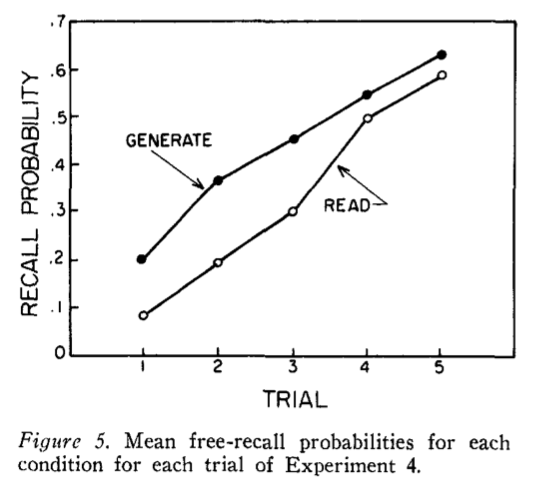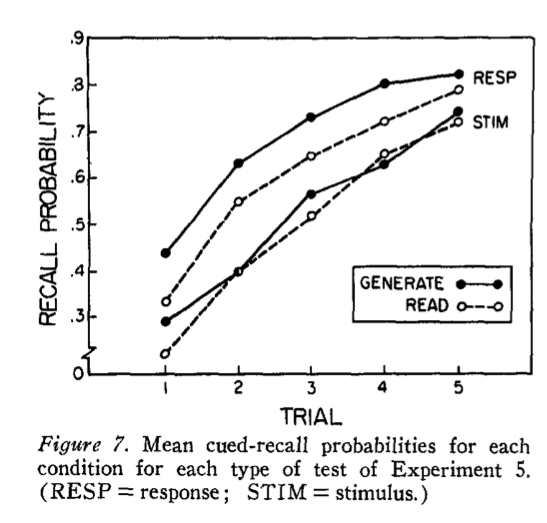Andyʼs working notes
About these notesSlamecka, N. J., & Graf, P. (1978). The generation effect: Delineation of a phenomenon. Journal of Experimental Psychology: Human Learning & Memory, 4(6), 592–604
First paper reporting the distilled existence of the Generation effect via a number of experiments.
Five experiments are reported comparing memory for words that were generated by the subjects themselves with the same words when they were simply presented to be read. In all cases, performance in the generate condition was superior to that in the read condition.
The task in all these tests was a kind of constrained association. In each experiment, subjects used a rule (e.g. “synonym”), a stimulus word (e.g. “rapid”), and an initial letter (e.g. “f”). That triplet might generate the word “fast.” (But I notice that it might also generate “fleet”). One group of students would simply read the stimulus word and the expected response; the other group would be expected to generate the response. This was followed by a memory test of the expected responses.
The first experiment showed that the generation effect did not vary substantially with rule or between timed and self-paced conditions. Even when correct in their answers, students who had generated the word associative pairs were more confident in their recognitions.
In the second experiment, subjects read some pairs and generated others; subjects were separated into two conditions, one of which was informed that they were going to be tested and the other was not. During the recognition test, students were also asked to recall whether they’d read the word or generated it during the study period. No effect was found between the informed and uninformed groups. This experiment confirmed the prior experiment’s results despite the within-subjects manipulation and found that correct recognition and correct attribution were related.
The third experiment explored the questions of whether the stimuli are also better recalled in the generation condition, since that would suggest the effect may be partially due to heightened attention. It found no significant generation effect on the stimuli.
The fourth experiment switched from recognition tests to free recall tests: students were asked to generate as many of the target words as they could. Yet again, generation produced more reliable recall.
The fifth experiment is the counterpart to the third for cued recall: students were asked to generate either the response or the stimuli given the other. The generation effect is again produced. The data suggests a stronger interaction for responses than for stimuli, but the statistical tests were inconclusive.
In the discussion, the authors note that the benefit can’t be attributed solely to a depth of processing argument (e.g. Desirable difficulties, after Bjork), since the rhyme rule doesn’t exhibit the effect less strongly than other much more complex rules.